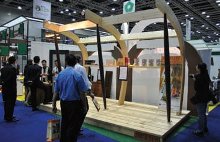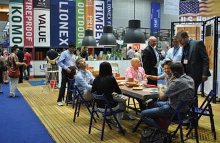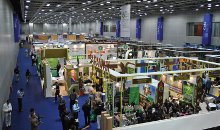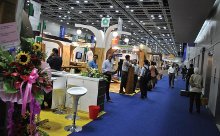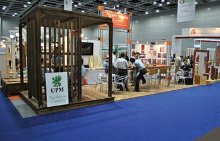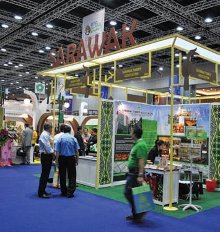Two-way trading street
27 October 2012The Global WoodMart in Malaysia underlined South-east Asia’s growing significance as a wood importer, as well as a supplier of timber and wood products worldwide. Mike Jeffree reports
On its 2010 launch, the Malaysian Timber Council Global WoodMart (MGW) set out to become "the international trading hub" for timber and wood products in South-east Asia.
It wasn't all progress this year, but the biennial event did take further steps towards its ambitious goal.
The disappointment was attendance, which fell, albeit marginally, from 2,046 to 2,002. However, while the organisers promised new strategies to boost numbers next time, the dip was not widely attributed to faults with the show, rather global recession, and especially the continuing depressed state of those major Asian wood products consumers, the US and European construction and interiors markets.
At the same time, visitors did come from more countries (61 against 50), and their quality was said to offset quantity. "They were here to buy, or make genuine enquiries," said one exhibitor.
Most other trends for MGW were reported as positive. It occupied 70% more space in the Kuala Lumpur Convention Centre and stand numbers rose around 10% to 118, with 20% comprising first-time exhibitors.
The show also set out its stall even more clearly as a two-way trading street; a shop window to the world for timber and wood products from Malaysia and its South-east Asian neighbours, and a selling opportunity to the region for suppliers from elsewhere. In fact, exhibitor numbers from abroad rose to 50% of the total, representing 22 countries.
South-east Asia long ago ceased being simply a tropical timber exporter and moved into value-added products. The next step was to import more timber to offer a wider selection of finished goods for export and increasingly affluent domestic markets. And after opening the MGW, Malaysian plantations minister YB Tan Sri Bernard Dompok told TTJ that the region's status as an importer would only grow.
"Malaysia's target is to increase timber exports from RM21bn this year to RM53bn in 2020, and to reverse our current 60/40 overseas sales ratio between raw timber and value-added goods," he said. "Greater use of boreal and temperate species must play a role in this."
Government pledge
The Malaysian government has pledged to create 375,000ha of new plantation forest to meet the industry's raw material needs, he added, but at the same time has taken more natural forest out of production on environmental grounds. Consequently, processors and manufacturers will also have to import more timber to meet volume requirements.
Other pointers to the increasing diversity of the Malaysian and wider regional timber sector were the greater variety of materials and products on display than in 2010, while indicators for its export ambitions included the prominence of eco-assurance across the range of goods.
"Our focus on environmental performance is partly because we're as committed to the future of our forests as anyone, but also because we want to continue to advance as a major global trader," said one Malaysian exhibitor. "With growing anti-illegal timber legislation, like the US Lacey Act and EU Timber Regulation (EUTR), we must move forward on these issues."
One exhibitor, Malaysia-based trader Carl Ronnow, has even launched a programme, backed by the European Timber Trade Federation, to help supplier mills get PEFC chain of custody certified.
While 32% of Malaysia's "permanent reserve" forests are certified, said managing director Anders Möller, only 10% of timber exports are sold as such.
"There's a missing link between forest and mill, which we want to bridge," he said. "Eight of our suppliers have now been certified, and five more are in the process."
Species covered by Ronnow's certification programme include meranti, keruing and merbau. The company was also showing teak, padauk, and pyinkado from Burma, for which it predicts growing demand following the EU's suspension of trade sanctions on Burmese timber and, said Mr Möller, the country's growing interest in securing an EU FLEGT Voluntary Partnership Agreement (VPA). Another Malaysian company highlighting its green credentials was ATH.
"Malaysian Timber Certification Scheme-accredited timber is increasingly important for us," said marketing manager Eddie Ping.
One of Indonesia's leading timber products manufacturers, Integra Group, was also promoting the FSC certification of its 150,000ha of forest concessions.
"Two are certified and the third should follow soon," said the company's Hendro Rusli. "And it's already benefiting exports."
Integra's mainly meranti range includes construction timber, scantlings, decking, joinery, outdoor and indoor furniture - and each month it ships 300 containers to the US alone.
And the company expressed satisfaction with its first MGW, seeing buyers from Europe, Australasia and Japan, as well as the US.
Michael Hermens, managing director of US$29m-turnover Malaysia-based South-east Asian trader APP Timber, was less enthusiastic due to visitor footfall, but still felt MGW had the potential to become the region's equivalent of France's Carrefour International du Bois - "Europe's premier timber show".
"Maybe they could even collaborate," he said.
Meanwhile, the APP stand demonstrated, perhaps more than any, the growing significance of South-east Asian markets as timber importers, with further processed products particularly notable.
"Malaysia, especially, is not a cheap labour country any more," said Mr Hermens. "So customers are increasingly after more processed goods to cut work content and boost yield."
Among APP's products were South American lenga sawn timber and components and European beech - "a price competitive substitute for rubberwood".
Softwood in South-east Asia
The increased profile of softwood at MGW further underlined the increasing diversity of Malaysian timber usage. APP itself showed ACQ-treated spruce and pine decking and pergola timber from UPM, and laminated radiate from New Zealand's Taranakipine, while the American Softwoods organisation and Canadian giant Canfor both made show debuts.
"We see growing potential here, particularly given rising local hardwood prices," said Tony Cao, Canfor (Asia) Corp general manager. "We still need to educate people about softwood's performance in tropical climates, but we recently sent a Thai customer a five-container trial order of cladding, furniture and door frames and they ordered 100 more."
The French Timber Pavilion also featured a display of pine and Douglas fir.
"It is not yet a big market for us, but we're sowing the seeds," said French Timber managing director Jean-François Guilbert.
Already well-established in South-east Asia, however, is French hardwood, and demand is growing, hence the pavilion comprising five suppliers, against 2010's one.
"South-east Asia already accounts for 25% of our sales," said Eric Julien of Eurochêne. "It's particularly good for our wide oak boards, but we're also selling beech and ash."
The American Hardwood Export Council (AHEC) Pavilion was also up five stands to 16.
"American hardwood sales in Malaysia in the first half hit US$10m, up 50%," said Sharon Shek of AHEC. "Growing production of more luxurious, diverse products is driving demand."
Robinson Lumber, meanwhile, was among the US exhibitors also viewing MGW as a buying forum.
"We're here to sell US timber to South-east Asia, which is where the economic growth is today - mainly white oak to higher end Malaysian manufacturers, and lesser grades of ash and other species elsewhere," said Robinson's Hank Marchal. "But we're also here to look at what other exhibitors are offering."
Malaysian timber users' appetite for a wider variety of species was also emphasised by the Ghana Forestry Commission stand. It was promoting secondary and 'substitute' species, such as denya and yaya, or white wenge, and also what senior manager Peter Zormelo said would be the imminent availability of Ghana's first EU FLEGT VPA-licensed timber.
Another interesting development was the Sarawak pavilion. According to one visitor, the Malaysian state's timber sector "historically ploughed an independent furrow", hence its absence from the 2010 show, and its appearance this year "underlined MGW's growing reputation".
"We decided the time was right to present our status as a one-shop stop for timber and wood products," said Fatimatawati Latif of the Sarawak Timber Industry Development Corporation. "We're Sarawak's fourth biggest export earner and derive 60% of income from value-added products."
Growth in engineered timber
Malaysia's accelerating move into engineered and other more technical products was clear at the show too, also prompting the UK's TRADA to take a stand. "This follows completion of a collaborative agreement with our Malaysian technical and research counterpart FRIM," said TRADA's Mark Wilkinson. "To export to Europe, these new products need testing to EU standards, where we have the expertise."
Among the latest engineered products on show were flooring, including sports hall products, from Professional Surfaces and veneer- and paper-wrapped finger-jointed timber and MDF door frames from Ahai. Meanwhile on its imposing 74m2 display, which won a best stand award, international trader Lionex featured an even wider range.
"Malaysia's future is not in sawn timber," said European sales director Frank Teeuwen. "It's about more user-friendly products, from pre-primed skirting and facia, to low-waste solutions and optimised timber products like three-ply scantlings. We've now opened our own door and window component factory in Jakarta, and it has heavy-duty finger-jointing, lamination, priming and assembly lines."
Final proof both of MGW's status as a two-way trading opportunity and the evolution of Malaysia's timber sector came from Exowood. The Malaysian hardwood mouldings, door and shutter producer has recently diversified into making European softwood glulam.
"We see potential uses from bar stands, to bridges and structural frames, even for mosques," said an Exowood spokesperson.
